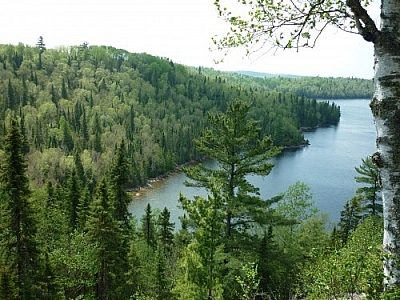Hitting home hard to a former Ontario Ranger (Esker Lakes Provincial Park, 1996) and current hiking enthusiast, the Ontario Ministry of Natural Resources recently announced that ten provincial parks will revert to non-operating status while it will also be transforming the overnight Ontario Ranger program to a day-based one.

Formerly the Junior Ranger program, the overnight teen work/camp experience has been running for nearly 60 years. Many remember it as a pivotal time that influenced them greatly. We came away having learned new skills clearing trails, paddling canoes, planting or pruning trees, and making spawning beds. We met new people and were introduced to new hobbies, like jogging or knitting. Everyone received first aid and WHMS training, and had to take turns on kitchen and cleaning duty. The beauty of the program was that it didn’t matter what you could already do, but what you were willing to try.
Now, the program will continue to operate as day camps, and students will be able to commute, said Michael Gravelle, Minister of Natural Resources to Reg Clayton of the Kenora Daily Miner and News.
Some skills will continue to be learned under this program, but it may not remain the avenue for individual growth it once was. No less because it used to be that applicants were assigned to parks further away from home so that they could benefit from the full experience of working and living in various ecosystems. Sending participants away from home used to be valued as having positive impacts on individual development and growth. But the Ministry is now focusing “on its core mandate of natural resource management” and streamlining the delivery of services. Quite possibly, shaping future generations of citizens to be engaged with the province’s natural resources is no longer its concern.
On the Friends of Killarney Park Facebook group, one poster commented that in such a small village, there are no youth to participate in the program. Yet, Killarney Provincial Park is one of Ontario’s gems and is highly visited — why would the program be cut there? The worry for others in the group is that with more budget cuts looming and an already tight belt, the park can’t afford to lose these vital employees.
The idea of operating a day-based program is doomed to fail in Northern Ontario unless infrastructure and population problems can be overcome. Unless the student staff members have access to a car, or a ride to work, how exactly will they commute? Parks are not serviced by public transportation. Are they in Southern and Eastern Ontario? If not, then the same problem arises there as well, though it is easier to add routes to already-established public transportation systems than to create brand-new bus services in rural communities.
As an aside, one Facebook group poster did sadly note that as a Junior Ranger, many would ride the Northlander to camp — now both are gone.
Reducing ten of the province’s provincial parks to non-operating status is also part of the McGuinty government’s transformation plan. The MNR estimates that approximately 95,000 people visited those ten parks last year; therefore, it will cease to maintain them and to offer services. The parks will remain open for day use free of charge, but that does not mean they will be accessible. Many trails in operating parks are not maintained due to lack of funds — this may only worsen our trail systems.
Case in point: The Height of Land Trail in Wakami Provincial Park should be one of Ontario’s most popular trekking destinations, being located on the dividing line between the Arctic and Atlantic watersheds, in addition to being 75 kilometres long one-way and offering the possibility of combining backpacking with a canoe trip. Yet, the trail is closed to hikers. Last spring, my partner and I were only allowed to canoe to a campsite, then hike at our own risk from there — we were not permitted to simply hike the trail to our campsite because of its condition. And this is an operating park unaffected by the proposed changes.
Hiking overnight in Missassagi Provincial Park — one of those converting to non-operating status — is a goal that may not remain possible for long without trail upkeep. Reliance on such services will revert to volunteer Friends of parks organisations with smaller budgets than the government’s.
Update: The City of Elliot Lake and the MNR have partnered to operate the park together. Read more about it in Backcountry Tripping in Mississagi Provincial Park.
Ontarians can shape the future of parks management. The Ministry of Natural Resources is accepting public comments until November 13th. A London teen has also launched a petition opposing the dismantling of the overnight Ontario Ranger program.
For nearly two years as Associate Editor of PublicValues.ca, I have followed and learned about many issues surrounding how governments manage public services. Fittingly, I have here been able to discuss topics personally significant to me, but above all they are matters of public interest: the public spaces inherent in our parks and the natural resources within them, access to public transportation, and participation in public conversations.
Sources
- Ontario cuts 28 full-time and 102 seasonal jobs at provincial parks in north
- Ontario axes Ontario Ranger program in MNR Transformation Plan
- Sun setting on Caliper Lake: Caliper Lake among 10 Ontario park closures
- Modernizing natural resource management
- Modernization of approvals: A proposed policy framework for modernizing approvals for Ontario’s natural resources (link removed)
- Teen pushing to save Ranger program: Allison Hauser has collected 1,750 names on a petition
- Dalton McGuinty, Premier of Ontario: Do not cut the overnight Ontario Ranger Program
This article originally appeared at PublicValues.ca.




Search Niackery
×